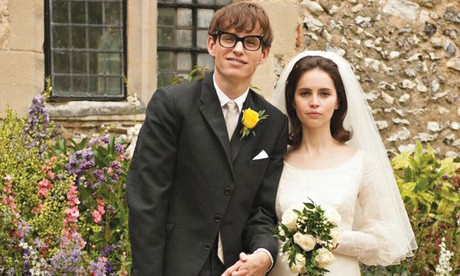Eddie Redmayne’s performance as physicist Stephen Hawking in The Theory of Everything is as endearing to watch as it was no doubt painful to perform. Loose-jawed and curled up in a wheelchair, Redmayne (Les Miserables) evinces the humor and gentle, tortured humanity of the great man and Simpsons guest star.
Paralyzed and speechless, given two years to live by his doctors, the astrophysicist amazed the world by surviving and writing a bestseller explaining his theories to ordinary readers. The Theory of Everything‘s sit-comish title accurately foretells a mainstreaming; it’s based on the memoir by Hawking’s wife Jane Wilde, whose piety still allowed an unusual domestic life. Prepare to be shocked if you’ve never read Lady Chatterley’s Lover—not that this film is at all explicit.
Director James Marsh, who has shown tremendous grit in series of documentaries, takes a very pastel approach to the near past. Cambridge in the early 1960s is a blue, blurry Camelot; Marsh uses reddish orange tints for moments when Hawking is seen alone, digesting the hard medical reasons for what had seemed to be just appealing clumsiness.
Top-drawer British actors turned out by the score—Emily Watson has a one-scene part as Wilde’s mother—but the picture is nigh-stolen by Maxine Peake as Hawking’s flirtatious caregiver. The role of Jane Wilde is an unusually large part for Felicity Jones, and her many fans can be pleased by her explanation of the need to keep re-asking where the study of the origin of time puts God (“On the endangered species list,” she frets). We can envision black holes and neutron stars, but an honest left-wing atheist academic with an openish marriage is still too strange a creature for the public to swallow, without buttering him and sweetening him first.
‘The Theory of Everything’ opens Nov. 21 at Summerfield Cinemas,
551 Summerfield Road, Santa Rosa. 707.522.0719.









